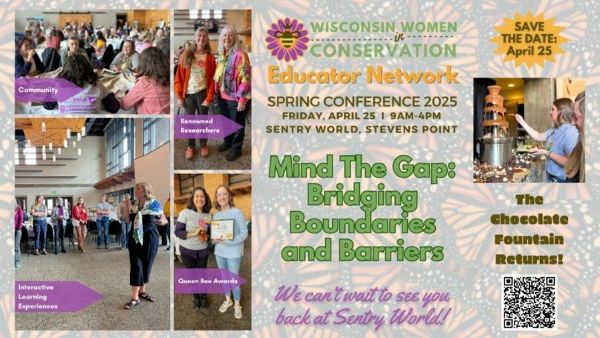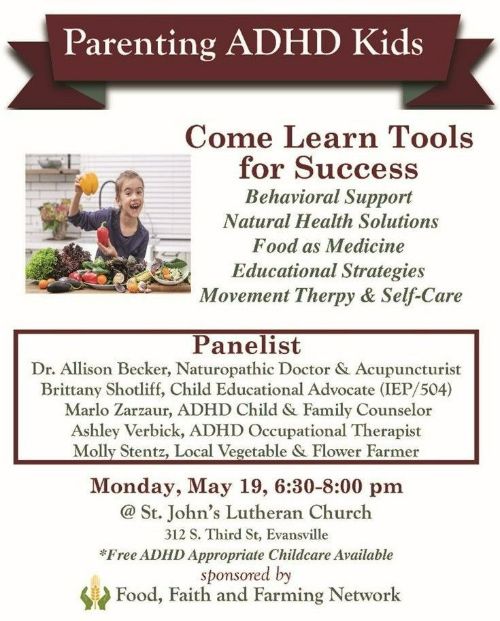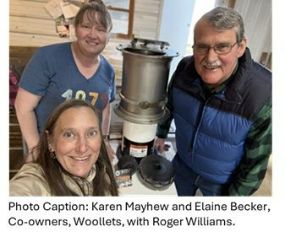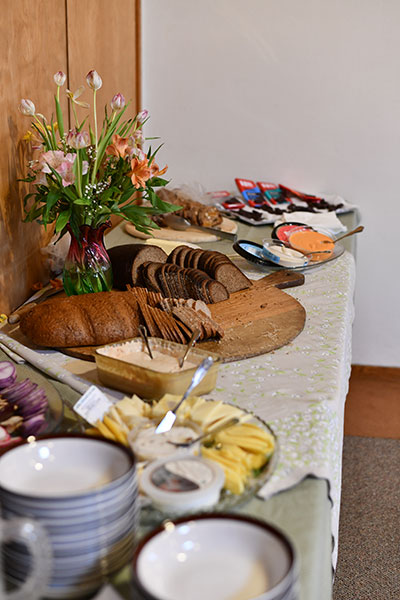Check out these recent stories from our Board Members as they provide updates on our 2025 Seed Money Projects.
Mind the Gap: Bridging Boundaries and Barriers
WiWiC Conference
by Sue Nelson
 I’m grateful I could attend the Wisconsin Women in Conservation Educator Network Conference on April 25th in Stevens Point. The conference was called: Mind the Gap: Bridging Boundaries and Barriers. The speakers centered on the needs of diverse women and their various farming practices. The day was divided into four main sessions: Women Think Differently: Key Elements of Women Landowner Education; Pushing the Envelope of the Rural/Urban Conversation; Community Building and Communication in Conservation.
I’m grateful I could attend the Wisconsin Women in Conservation Educator Network Conference on April 25th in Stevens Point. The conference was called: Mind the Gap: Bridging Boundaries and Barriers. The speakers centered on the needs of diverse women and their various farming practices. The day was divided into four main sessions: Women Think Differently: Key Elements of Women Landowner Education; Pushing the Envelope of the Rural/Urban Conversation; Community Building and Communication in Conservation.
Dr. Annie Jones, Professor of Organizational Development and Tribal Nations Liaison, UW Extension Madison started the conference off with her keynote address, “Keep Calm and Bridge the Divide: Authentic Relationship Building”. Her presentation of the Indigenous teaching tool of the Medicine Wheel and it's 5 Key Components - Self, Spirit & Purpose, Heart, Mind and Body was one of the best reminders that all conservation educators share the role and responsibility of growing a community of women stewarding the soil. How grateful we should be to the many people and cultures who've gone before us and passed their knowledge on to us. We are all connected to the land and each other.
There were 100 women in attendance. We are delighted that our Seed Money grant helped to make the program a success.
Food Is Medicine
by Penny Molina
 On May 19th one of our Seed Money recipients sponsored a panel presentation on the healing benefits of eating local, organic, nutritious foods among those who are suffering from ADHD. In addition to bringing in skilled professionals in the field they developed a resource booklet for parents which included a listing of local farmers who could provide them with healthy foods. They encouraged attendees to join their local ADHD Kids Support Group. Penny Molina from Still Point Flower Farm who applied for Seed Money shared their project’s success story shortly after the event.
On May 19th one of our Seed Money recipients sponsored a panel presentation on the healing benefits of eating local, organic, nutritious foods among those who are suffering from ADHD. In addition to bringing in skilled professionals in the field they developed a resource booklet for parents which included a listing of local farmers who could provide them with healthy foods. They encouraged attendees to join their local ADHD Kids Support Group. Penny Molina from Still Point Flower Farm who applied for Seed Money shared their project’s success story shortly after the event.
“We had 40 people at the panel presentation with many more wanting the booklet, including the area's School Counselors. Twenty-five people signed up for an ongoing support group. The church copied the booklets at no cost. We paid the speakers and plan to use the remaining money for the ADHD parents/families to use on local organic foods as vouchers. They were VERY excited about that as are the farmers listed in the resource guide who will benefit from getting the vouchers!!
So all in all, I would say Food, Faith and Farming Network's grant seeded a LOT for this ADHD community.”
Woollets: An Alternative Soil Amendment
by Roger T. Williams
 One of the thirteen Seed Money projects our Network funded for 2025 is an initiative in the Argyle area focusing on “Woollets:” pellets made from waste wool that serve as a soil amendment to improve water retention, help aerate the soil, improve soil structure and add nitrogen as well as a slow release of other soil nutrients.
One of the thirteen Seed Money projects our Network funded for 2025 is an initiative in the Argyle area focusing on “Woollets:” pellets made from waste wool that serve as a soil amendment to improve water retention, help aerate the soil, improve soil structure and add nitrogen as well as a slow release of other soil nutrients.
As a Network project reviewer, I was intrigued with the many benefits offered by Woollets. And, as a gardener with heavy soil, resistant to previous attempts at loosening it and improving water retention, I wanted to try Woollets in my garden. So, I drove to Argyle on April 7 to purchase these “magical” pellets and learn more about the pelleting operation from Woollets owners Elaine Becker and Karen Mayhew. Elaine and Karen sought a Seed Money grant to replace the die and rollers in their pelleting machine. They both greeted me at Karen’s farm and were MOST grateful for our grant. They showed me their labor-intensive pelleting process and shared hopes for taking their business to a larger scale. It felt good to be on the ground floor of a business that could provide an important soil amendment that is not dependent on fossil fuels.
I bought ten pounds of the Woollets and applied them to my garden as follows: on the half of my garden that has row crops, I broadcast the pellets and worked them into the top three inches of soil (Elaine and Karen’s recommendation); the other half of my garden is planted to seedlings (tomatoes, peppers, cabbage, eggplants and Brussel sprouts) and each of these plants received a few pellets while being planted as well as the broadcast spreading of pellets. Time will tell whether Woollets make a difference in my soil health and garden productivity…but I’m intrigued with the idea and am giving it a try!
To learn more about Woollets, check out their website, watch their video, and see if there is a retailer near you. https://www.woollets.net/
Hybrid Corn Meeting in Madison
By Sue Nelson
Edited by Rita Hindin
 On Tuesday April 22nd I attended a meeting in Madison at the Arbor Good Neighbor House (AGNH) that explained the potential of Mandaamin Institute's Hybrid Corn Varieties. The director of the Mandaamin Institute, Walter Goldstein, presented his findings accrued from the study of bred corn using classical, not bioengineering, methods. Partnership breeding is what Goldstein calls this. Taking the following from the write up I received from Rita Hindin - "Partnership Breeding...puts the plant and the human into a respectful and co-evolving relationship." These efforts bring distinctive features that benefit the land and its inhabitants. For more details check out their website: www.mandaamin.org.
On Tuesday April 22nd I attended a meeting in Madison at the Arbor Good Neighbor House (AGNH) that explained the potential of Mandaamin Institute's Hybrid Corn Varieties. The director of the Mandaamin Institute, Walter Goldstein, presented his findings accrued from the study of bred corn using classical, not bioengineering, methods. Partnership breeding is what Goldstein calls this. Taking the following from the write up I received from Rita Hindin - "Partnership Breeding...puts the plant and the human into a respectful and co-evolving relationship." These efforts bring distinctive features that benefit the land and its inhabitants. For more details check out their website: www.mandaamin.org.
Our Network seed money grant helped offer a donation for use of AGNH, photocopy material for distribution and provide a meal for this event. It was a delicious fair of soups, breads, fruits and sweets--mostly organic.
In addition to local farmers and several curious community members, the ~ 20 attendees included researchers, professors and folks that had bio-ag backgrounds. Attendees with space on their farm and the desire to plant Mandaamin corn were gifted seed to trial on up to 1/3 acre if they agreed to provide Mandaamin feedback about their growing experience. AGNH has a mini-farm on site and the farmer will be planting the corn. Another local farmer will be planting the corn and cultivating it under two different management strategies in a joint citizen science project with Mandaamin Institute. A third recipient, three members of a farm family, https://shireregenerative.farm/, came from the Quad City area. They learned of the event from Rita and are very selective in what they plant and how it is grown. They managed to coordinate a delivery of their produce to a Madison restaurant so they could make the trip to attend the meeting. They too received corn to grow. Many of Shire Farm’s other buyers are people with digestive care needs.
This was a very interesting event. Definitely new to me.